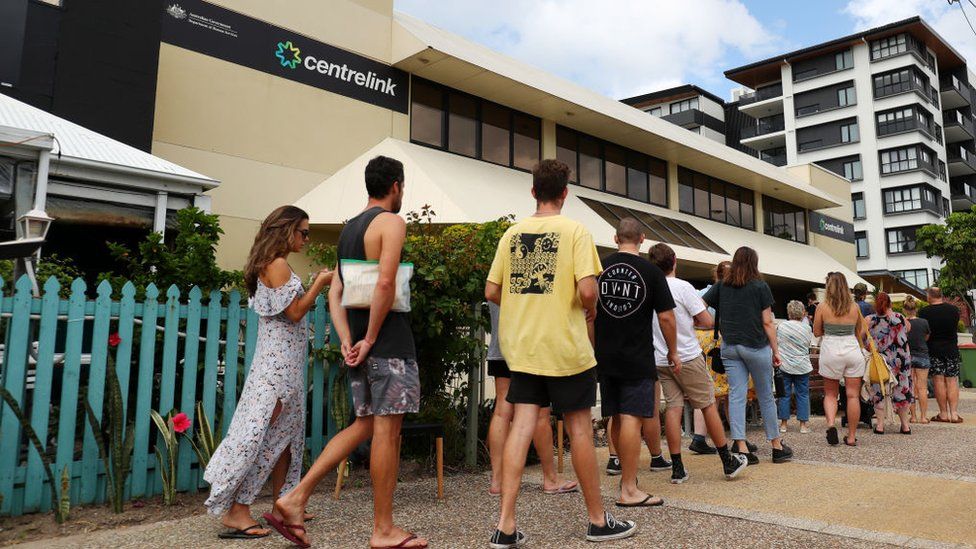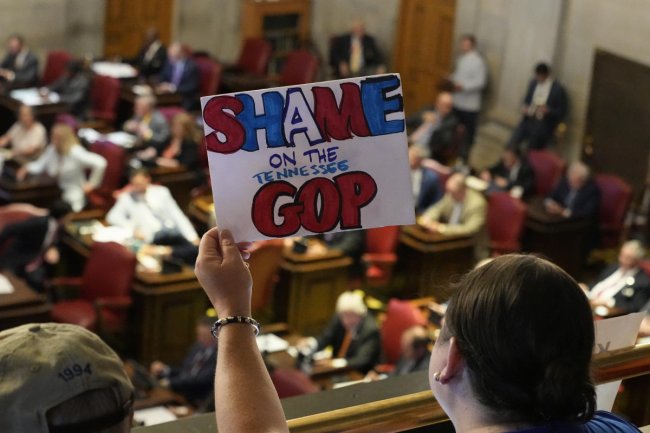[World] Robodebt: Illegal Australian welfare hunt drove people to despair
Image source, Getty ImagesImage caption, The "Robodebt" policy vilified recipients of welfare, an inquiry has foundBy Frances MaoBBC NewsA landmark inquiry in Australia has found an illegal welfare hunt by the previous government made victims feel like criminals and caused suicides.Known locally as "Robodebt", it was an automated government scheme which incorrectly demanded welfare recipients pay back benefits.People received letters saying they owed thousands of dollars in debt, based off an incorrect algorithm.More than half a million Australians were affected by the policy.The scheme ran from 2016 until it was ruled illegal by a court in 2019. It had forced some of the country's poorest people to pay off false debts.Many were forced into worse financial circumstances - taking out loans, selling their cars or using savings to pay off a debt they were told they had to pay within weeks. Others described being vilified and feeling shame after being told they owed money.On Friday, a roya
![[World] Robodebt: Illegal Australian welfare hunt drove people to despair](https://www.9020blog.com/uploads/images/202307/image_750x_64a7f9c023bbc.jpg)

A landmark inquiry in Australia has found an illegal welfare hunt by the previous government made victims feel like criminals and caused suicides.
Known locally as "Robodebt", it was an automated government scheme which incorrectly demanded welfare recipients pay back benefits.
People received letters saying they owed thousands of dollars in debt, based off an incorrect algorithm.
More than half a million Australians were affected by the policy.
The scheme ran from 2016 until it was ruled illegal by a court in 2019. It had forced some of the country's poorest people to pay off false debts.
Many were forced into worse financial circumstances - taking out loans, selling their cars or using savings to pay off a debt they were told they had to pay within weeks. Others described being vilified and feeling shame after being told they owed money.
On Friday, a royal commission inquiry into the scandal issued its final report, describing the scheme as a "costly failure of public administration" with "extensive, devastating, and continuing" ill-effects.
"Robodebt was a crude and cruel mechanism, neither fair nor legal, and it made many people feel like criminals," Commissioner Catherine Holmes wrote in her 990-page report.
A royal commission is Australia's most powerful form of public inquiry. This one ran for 11 months and drew hundreds of public submissions.
On Friday, Prime Minister Anthony Albanese condemned the previous government's scheme as a "gross betrayal" of citizens, which had harmed the most vulnerable.
The inquiry found there were at least three known suicides as a result of Robodebt policy, and it was "confident that these were not the only tragedies of the kind".
The deaths by suicide included two young men Rhys Cauzzo, 28, and Jarrad Madgwick, 22, whose mothers gave testimony to the commission last year on their behalf. Kath Madgwick had previously told the BBC she holds the government partly responsible for Jarrad's suicide.

Other victims told the inquiry how the stress of a debt demand had caused them anxiety and depression and led them to consider suicide.
One woman said she felt suicidal for a period of months with the debt hanging over her head, with the "lowest point" being the day the debt collector debited the money from her bank account.
"I felt desperate on that day; it was so upsetting that I could not afford to pay for my daughter's medical expenses and I felt powerless to improve my situation," she told the inquiry.
Another victim, who had experienced mental illness previously, said that upon receiving a $A11,000 (£6,300, $8,100) debt notice, he was in "complete shock", because it would "set me back years and years and years".
He explained that "from a generalised anxiety disorder point of view, it's just… the biggest trigger you can give to somebody".
The inquiry's final report on Friday criticised former Prime Minister Scott Morrison's conservative government for launching the scheme where "little to no regard was had to the individuals and vulnerable cohorts that it would affect".
The report also condemned Mr Morrison - who had been minister of the social services department at the time the policy was launched - for "misleading" Cabinet over advice that the switch to an automated system would not require legislative passage.
In response on Friday, Mr Morrison said he rejected "each of the findings which are critical of my involvement in authorising the scheme and are adverse to me".
He maintained he had "acted in good faith and on clear and deliberate department advice".
The report also accused the government of persisting with a cover-up of the scheme even when its "unfairness, probable illegality and cruelty became apparent" in 2017.
"It should then have been abandoned or revised drastically, and an enormous amount of hardship and misery... would have been averted," it said.
"Instead the path taken was to double down, to go on the attack in the media against those who complained and to maintain the falsehood that in fact the system had not changed at all."
Commissioner Holmes also described a politicisation of welfare policy that had exacerbated a stigma often felt by recipients of social welfare.
The government also falsely exaggerated incidents of welfare fraud which were "miniscule" or less than 0.1% of cases, the report found.
In a sealed section of the report, the commissioner also recommended that a number of unidentified individuals involved in the policy be referred to criminal and civil prosecution.
The Morrison government abruptly ended the Robodebt scheme in 2019 after victims contested the legal basis in the Federal Court of Australia, where it was found to be illegal.
In its backdown, the government was also forced to refund over A$700m of payments to victims. It also settled a multimillion-dollar lawsuit brought by victims seeking compensation.
If you are feeling emotionally distressed and would like details of organisations in the UK which offer advice and support, go to bbc.co.uk/actionline.
If you are in Australia, you can call Lifeline at 131114, Kids Helpline at 1800 55 18000 or visit the Beyond Blue website.
Related Topics
What's Your Reaction?













